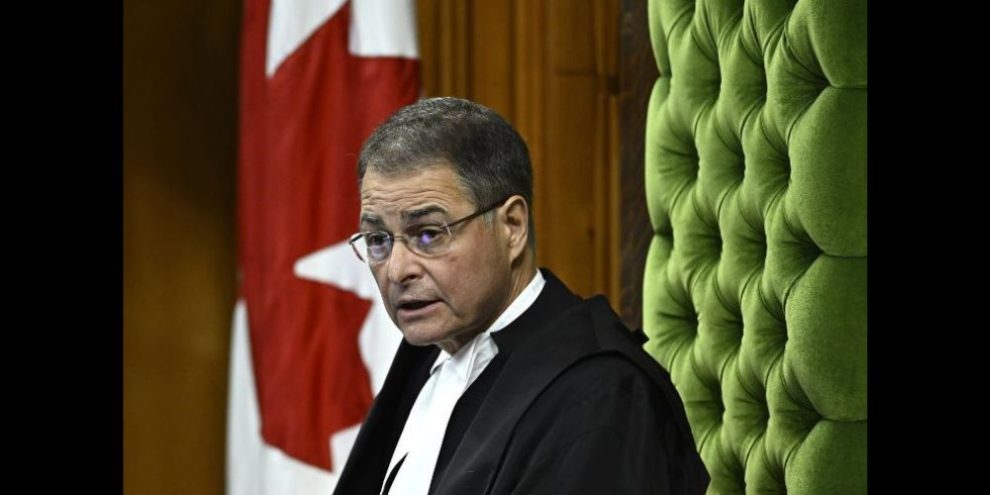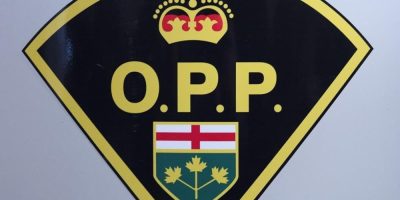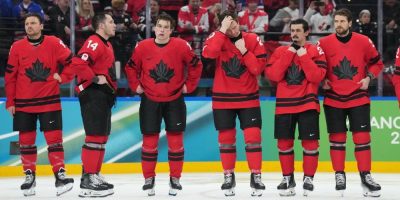
By Mickey Djuric in Ottawa
House of Commons Speaker Anthony Rota has resigned after he invited a man who fought for the Nazis to attend Ukraine President Volodymyr Zelenskyy's address to Parliament last week.
Senior Canadian politicians have called the invitation an international embarrassment, while Russia is using the controversy to advance propaganda that seeks to legitimize its full-scale invasion of Ukraine.
"This House is above any of us. Therefore, I must step down as your Speaker," Rota, who was first elected to the role in December 2019, told the House of Commons ahead of question period on Tuesday.
All sides had called for Rota to resign after he invited and recognized in the House a Ukraine military veteran now living in Canada who had served in a Nazi unit during the Second World War.
Government House leader Karina Gould said Tuesday that members of Parliament had lost confidence in Rota, the Liberal MP for the northern Ontario riding of Nipissing-Timiskaming.
During his resignation speech, Rota reiterated his "profound regret" for recognizing 98-year-old Yaroslav Hunka, a veteran of the First Ukrainian Division, last Friday in the House of Commons. Hunka lives in his riding.
The voluntary unit was under the command of the Nazis and was also known as the Waffen-SS Galicia Division or the SS 14th Waffen Division during the Second World War.
All members of Parliament who were in attendance had stood twice and applauded Hunka without knowing the details of his past, including Prime Minister Justin Trudeau and main opposition leaders.
Zelenskyy had also joined in the applause.
"We all did this on the understanding that we were applauding a Canadian and Ukrainian war hero," said Gould, who is a descedant of Holocaust survivors.
"I assumed he was a partisan. I assumed we were applauding someone who fought the Nazis and fought the communists. Never in my life would I imagine the Speaker of the House would ask us to stand and applaud someone who fought with the Nazis."
Many MPs, some of whom are Jewish, later expressed their disgust in participating in the ovation. On Tuesday, the House unanimously supported a Bloc Québécois motion that condemned Naziism in all its forms, condemned the invitation itself and said any tribute made to the veteran should be retracted.
"That public recognition has caused pain to individuals and communities, including the Jewish community in Canada and around the world, in addition to survivors of Nazi atrocities in Poland among other nations," Rota said in the House of Commons on Tuesday.
The Canadian Polish Congress said it appreciated that Rota's third apology finally mentioned Poland, after it advocated for Polish citizens who died in the Second World War to be acknowledged.
"What made it worse, frankly, was the Speaker's initial statement and even his follow-up statement did not mention the Polish community," said Dominik Roszak, first vice president of the Canadian Polish Congress.
The Friends of Simon Wiesenthal Center, an advocacy group that had called for Rota to step down, also said Tuesday that it welcomed the resignation speech.
Only two Speakers elected since Confederation have left partway through a parliamentary session, including one who died and another who was named governor general.
Rota has apologized in the House twice after issuing an initial apology over the weekend. He said he alone was responsible for the decision and that neither the Prime Minister's Office nor the Ukrainian delegation had been aware of it. Still, MPs felt there was no other alternative than for him to step down.
Conservative Leader Pierre Poilievre said his party would be pushing for hearings to determine how this happened. He added he believes Trudeau should testify.
"Canada's reputation is broken. This is by far the biggest hit Canada's diplomatic reputation has ever taken in it's history. And it happened under Justin Trudeau's watch," Poilievre said Tuesday.
Rota, who as Speaker was tasked with remaining impartial and maintaining order in the House of Commons, has been facing an international uproar over the recognition of Hunka.
Russia has used the news to advance its propaganda in an attempt to legitimize its full-scale invasion of Ukraine.
Russian President Vladimir Putin paints his enemies in Ukraine as "neo-Nazis."
The Holocaust, the Second World War and Nazism have been important tools for Putin in his bid to legitimize Russia's war in Ukraine, but historians see their use as disinformation and a cynical ploy to further the Russian leader’s aims.
Zelenskyy is Jewish and has said his great-grandparents were victims of the Nazis.
His visit to Canada was meant to shore up support for Ukraine during the war, but now the opposite is happening, NDP Leader Jagmeet Singh said Tuesday.
"The visit was marred by this incident that is now being used by the aggressor, Russia, in propaganda to attack or take away from — in a deleterious way — the efforts of the war."
Singh called on Trudeau to apologize for how things have unfolded, and present a plan to try and undo the harm.
The Conservatives have said Trudeau is throwing Rota under the bus and that the prime minister should take responsibility for the invitation.
Trudeau, who was in Toronto on Tuesday afternoon, was not present in the House of Commons when Rota announced his resignation.
Earlier Tuesday the prime minister, who called the mistake "deeply embarrassing," said he expected Rota was reflecting on how to maintain dignity in the Commons.
Rota's resignation came after he met with House leaders for the main federal parties. It is set to take effect at the end the sitting on Wednesday.
This will allow preparations for new a Speaker to be elected. Until that time, deputy speakers will chair House proceedings.
One of those deputy speakers, Conservative MP Chris D'Entremont, immediately replaced Rota in the chair for question period.
A garden party the Speaker was set to host at the Farm, the official residence in Kingsmere, Que., on Tuesday evening was also cancelled.
This report by The Canadian Press was first published Sept. 26, 2023.
— With files from Mia Rabson and The Associated Press.
Banner image via The Canadian Press





